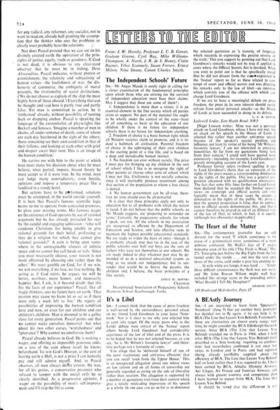It's a Libel
SIR,-1 cannot think that the cause of press freedom is well-served by the extraordinary personal attack on my friend Lord Goodman in your latest 'Note- book.' Nor is it clear to me why you selected him as your sole target. Of the many peers who in the Lords' debate were critical of the 'Justice' report others beside Lord Goodman had considerable experience of the law of libel and of the press. It is to be hoped that he was not selected because, as you say, 'he is Mr Wilson's favourite lawyer' and there- fore perhaps not a favourite of yours.
You allege that he 'delivered himself of one of the most reactionary and anti-press effusions' that you can recall 'even from the Upper. House.' This is an unexpected allegation about one whose views on law reform and on all forms of censorship are generally regarded as erring on the side of liberality rather than reaction. The allegation is supported by a number of quotations torn from their context which give a totally misleading impression of his speech as a whole. In one case you go so far as to denounce
the selected quotation as 'a travesty of language which succeeds in expressing the precise reverse of the truth.' This you support by pointing out that Lord Goodman's remarks would not be true if applied to cases where the Official Secrets Act is invoked. What you omit to point out is that he specifically stated that he did not dissent from the viin,expressed in the 'Justice' report so far as these related to con- tempt of court and official secrets and was directing his remarks only to the law of libel—an omission which convicts you of the offence• with which you charge Lord Goodman.
If • we are to have a meaningful debate on press freedom, the press in its own interest should surely refrain from unfair personal attacks—as the House of Lords at least succeeded in doing in its debate. L. C. B. GOWER Ladywell Lodge, East Heath Road, NW 3 [Nigel Lawson writes: Mine was not a personal attack on Lord. Goodman, whom I have not met, but an attack on his speech in the House of Lords. 1 selected this rather than another anti-press speech because of the speaker's special position and influence, not least by virtue of his being `Mr Wilson's favourite lawyer.' I am not interested in attacking nonentities. So far from my quotations being 'torn from their context,' I could well have quoted more extensively—including, for example, Lord Goodman's gravely misleading account of the Lewis case.
Professor Gower refers (without spelling it out) to Lord Goodman's thesis that an extension of the rights of the press means a corresponding diminution in the rights of the public. This was a general pro- position advanced with no qualification whatsoever. The fact that some fifty lines further on Lord Good- man declared that he accepted the 'Justice' report's views on contempt and official secrets can only logically mean that in these cases he accepts a diminution in the rights of the public. My point is that the general proposition is false, that its applica- tion to official secrets demonstrates this, and that it cannot therefore be prayed in aid of an illiberal view of the law of libel, to which, in fact, it is equally (although less obviously) inapplicable.]


































 Previous page
Previous page